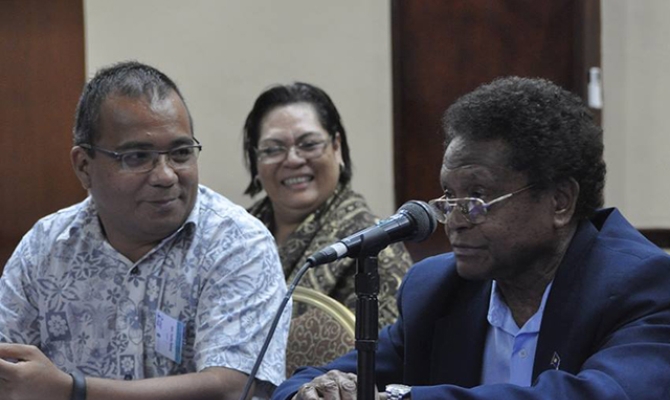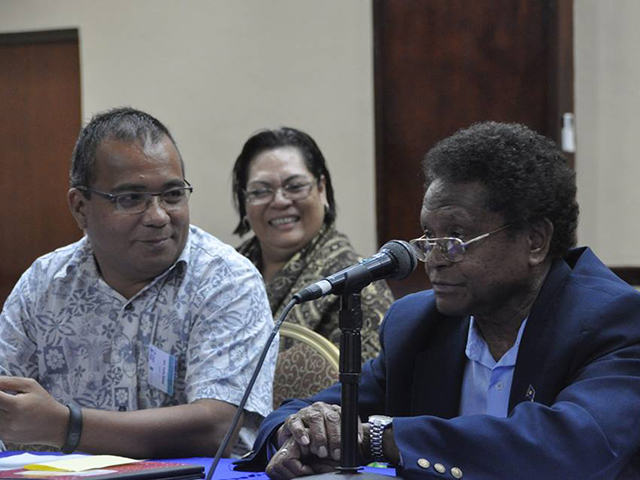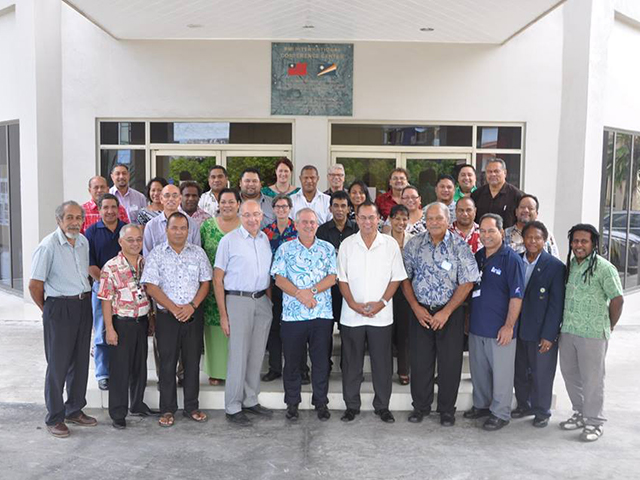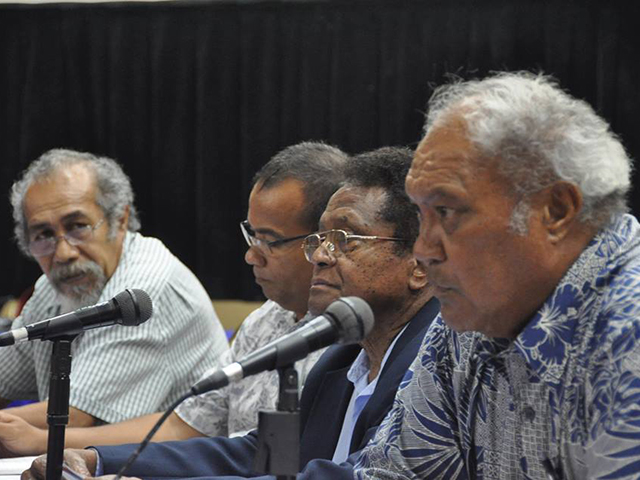
Climate Change Resilience
Ministers and officials from 14 Pacific island countries have attended specialised training to ensure that their individual and collective voices will be heard loudly, clearly and convincingly at upcoming climate change negotiations in Lima and Paris.
The High Level Support Mechanism (HLSM) preparatory meeting, held last week in the Republic of the Marshall Islands, was specially designed to heighten the effectiveness of Ministers and their climate change officials in the negotiations process, thus improving the likelihood that Pacific island concerns and priorities are incorporated into the final outcomes.
The training was undertaken by the Secretariat of the Pacific Regional Environment Programme (SPREP) and Climate Analytics, with technical support from the Caribbean Community Climate Change Centre, Pacific Islands Forum Secretariat and the Green Climate Fund.

SPREP's Climate Change Adaptation Adviser, Ms Diane McFadzien, explains that this period of time leading up to the United Nations Framework Convention on Climate Change (UNFCCC) Conference of the Parties in Lima (COP 20) and Paris (COP 21) is absolutely crucial for negotiation preparations:
"Next year is gearing up to be pivotal in global climate change response, with a new international agreement on climate change set to be adopted in Paris in December 2015. The details of this agreement will not only involve emissions targets, but will also put in place provisions for supporting developing countries, with regard to climate change finance, technology transfer and capacity building for adaptation and mitigation. As our region is one of the most vulnerable to the impacts of climate change, we need to ensure that Pacific island voices are heard and our views are taken into account."
More than 30 Pacific island participants attended the Majuro training, which was deliberately planned to take place immediately after the 25th Annual Meeting of the Pacific Regional Environment Programme.

Throughout the meeting, participants received specialist advice and insight from lead negotiators such as Mr Carlos Fuller and Ms MJ Mace from the Alliance of Small Island States (AOSIS), as well as access to lead authors from the Intergovernmental Panel on Climate Change (IPCC) - Mr William Hare, from both Climate Analytics and the Potsdam Institute in Berlin, and SPREP's own Director of Climate Change, Dr Netatua Pelesikoti .
Ms Pelesikoti explains that one emphasis of the training was to provide participants with a thorough overview on the latest climate change science:
"It is very important that Pacific island countries understand the full implications that current emission pathways for greenhouse gases will have on their long term survival and sustainability. This grounding helps explain why current pledges within the UN climate change negotiations are simply not sufficient to ensure the long term viability of Pacific Island nations."

SPREP's Climate Change Support Secondment, Mr Ewan Cameron, thanked the Government of the Republic of the Marshall Islands for generously hosting the HLSM Meeting in Majuro, and for showing dedication and leadership on issues related to climate change:
"In 2014 the Marshall Islands hosted and chaired the Pacific Islands Forum Leaders' meeting at which leaders pledged mitigation targets through the development of the Majuro Declaration. It's fantastic to see this collective exhibition of Pacific leadership continue in advance of the COP20 in Lima this December."
The four-day programme received excellent feedback from all involved, with many participants articulating the importance of Pacific island representatives coming together prior to key international meetings so that "everyone is on the same page."
The HLSM training was made possible through the support of Climate Analytics and the Government of Germany. Support was also provided by the British High Commission in Suva, and the Governments of Australia and New Zealand.
For more information, please contact Diane McFadzien on dianem@sprep.org or Ewan Cameron on
ewanc@sprep.org
The High Level Support Mechanism (HLSM) preparatory meeting, held last week in the Republic of the Marshall Islands, was specially designed to heighten the effectiveness of Ministers and their climate change officials in the negotiations process, thus improving the likelihood that Pacific island concerns and priorities are incorporated into the final outcomes.
The training was undertaken by the Secretariat of the Pacific Regional Environment Programme (SPREP) and Climate Analytics, with technical support from the Caribbean Community Climate Change Centre, Pacific Islands Forum Secretariat and the Green Climate Fund.

HLSM participants appreciated the opportunity to caucus informally, allowing for the type of candid discussions that can't always take place in larger group settings.
SPREP's Climate Change Adaptation Adviser, Ms Diane McFadzien, explains that this period of time leading up to the United Nations Framework Convention on Climate Change (UNFCCC) Conference of the Parties in Lima (COP 20) and Paris (COP 21) is absolutely crucial for negotiation preparations:
"Next year is gearing up to be pivotal in global climate change response, with a new international agreement on climate change set to be adopted in Paris in December 2015. The details of this agreement will not only involve emissions targets, but will also put in place provisions for supporting developing countries, with regard to climate change finance, technology transfer and capacity building for adaptation and mitigation. As our region is one of the most vulnerable to the impacts of climate change, we need to ensure that Pacific island voices are heard and our views are taken into account."
More than 30 Pacific island participants attended the Majuro training, which was deliberately planned to take place immediately after the 25th Annual Meeting of the Pacific Regional Environment Programme.

Ministers and officials at the HLSM meeting agreed that positive outcomes are contingent on careful preparation.
Throughout the meeting, participants received specialist advice and insight from lead negotiators such as Mr Carlos Fuller and Ms MJ Mace from the Alliance of Small Island States (AOSIS), as well as access to lead authors from the Intergovernmental Panel on Climate Change (IPCC) - Mr William Hare, from both Climate Analytics and the Potsdam Institute in Berlin, and SPREP's own Director of Climate Change, Dr Netatua Pelesikoti .
Ms Pelesikoti explains that one emphasis of the training was to provide participants with a thorough overview on the latest climate change science:
"It is very important that Pacific island countries understand the full implications that current emission pathways for greenhouse gases will have on their long term survival and sustainability. This grounding helps explain why current pledges within the UN climate change negotiations are simply not sufficient to ensure the long term viability of Pacific Island nations."

Popular components of the training included a mock ministerial press conference and ministerial bilateral. Officials also undertook a full day of mock UN simulation training where they had to negotiate a live text.
SPREP's Climate Change Support Secondment, Mr Ewan Cameron, thanked the Government of the Republic of the Marshall Islands for generously hosting the HLSM Meeting in Majuro, and for showing dedication and leadership on issues related to climate change:
"In 2014 the Marshall Islands hosted and chaired the Pacific Islands Forum Leaders' meeting at which leaders pledged mitigation targets through the development of the Majuro Declaration. It's fantastic to see this collective exhibition of Pacific leadership continue in advance of the COP20 in Lima this December."
The four-day programme received excellent feedback from all involved, with many participants articulating the importance of Pacific island representatives coming together prior to key international meetings so that "everyone is on the same page."
The HLSM training was made possible through the support of Climate Analytics and the Government of Germany. Support was also provided by the British High Commission in Suva, and the Governments of Australia and New Zealand.
For more information, please contact Diane McFadzien on dianem@sprep.org or Ewan Cameron on
ewanc@sprep.org